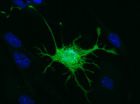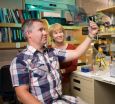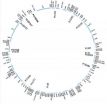(Press-News.org) VIDEO:
University of Iowa Communication Studies researchers Keli Steuber and Andrew High talk about infertility.
Click here for more information.
Many women coping with infertility count on relatives or close friends for encouragement and assistance. But according to research at the University of Iowa, when it comes to support, women may not be receiving enough—or even the right kind.
"Infertility is a more prevalent issue than people realize. It affects one in six couples, and in almost all cases, women want more support than they are getting," says Keli Steuber, assistant professor in communication studies at the UI and co-author of the paper, published this week in the print edition of the journal Communication Monographs.
The study comes on the heels of National Infertility Awareness Week, a movement started in 1989 by the National Infertility Association to raise awareness about infertility and to encourage the public to better understand their reproductive health.
Steuber and Andrew High, assistant professor in communication studies at the UI and the paper's co-author, surveyed more than 300 women across the nation who were coping with infertility.
They found that infertile women want more support of all kinds—ranging from practical aid such as help with household chores, to advice and emotional reassurance like hearing a spouse say, "I love you."
Without this support, women wrestling with infertility may become depressed or be less able to cope with stress, according to the researchers.
The good news is there are easy ways a spouse, relative, or friend can be more supportive, say Steuber and High. Though family and friends have the best of intentions, the study found they tend to dole out too much advice.
The researchers say it's best to keep the advice to a minimum and instead focus on other ways to be supportive. That could be as simple as cooking a meal or connecting your loved one to other women with whom she can share her feelings.
"People are overwhelmed by unsolicited advice from family and friends," says Steuber, who cites mom, female relatives, and other women with children as key perpetrators when it comes to doling out excessive information.
"Parents perceive themselves to be experts in having children, but they may not be well-informed. That puts women in an awkward position," she explains.
As for spouses? High and Steuber found that while women cited their husbands as the strongest source of emotional support, many felt their spouses could provide more.
That's not surprising, say High and Steuber, who note previous research has suggested that men feel uncomfortable talking about infertility issues. That can leave women feeling like some of their emotional needs are not being addressed.
"It's a very real strain on the marriage," says High.
The researchers suggest that husbands become a more active participant in their wives' infertility treatments by attending appointments, advocating for their spouse, and helping them explore alternatives to pregnancy or other treatment options.
"Becoming more involved gives you the opportunity to be more emotionally invested," says High.
And Steuber adds that couples who stick together through the infertility experience often have a stronger marital foundation moving forward. "If you can find effective, supportive ways to communicate with each other, you're better equipped to handle stressors down the road," she explains.
In addition to close friends and family, the researchers also looked at the support provided by doctors and nurses. "We found those in healthcare often see themselves as sources of information rather than someone who can provide emotional support or suggest a valuable network of contacts," says High.
Though the researchers acknowledge there is no simple solution, they suggest doctors and nurses could help women feel better supported by spending additional face time with their patients, phrasing questions in an empathetic manner, and handing out resources tailored to individual needs.
INFORMATION:
The UI Office of the Vice President for Research and Economic Development funded the study.
Infertile women want more support
University of Iowa study shows infertile women feel a lack of support and suggests ways loved ones can help
2014-04-30
ELSE PRESS RELEASES FROM THIS DATE:
Stem cells from teeth can make brain-like cells
2014-04-30
University of Adelaide researchers have discovered that stem cells taken from teeth can grow to resemble brain cells, suggesting they could one day be used in the brain as a therapy for stroke.
In the University's Centre for Stem Cell Research, laboratory studies have shown that stem cells from teeth can develop and form complex networks of brain-like cells. Although these cells haven't developed into fully fledged neurons, researchers believe it's just a matter of time and the right conditions for it to happen.
"Stem cells from teeth have great potential to grow into ...
Salk Institute study identifies novel regulator of key gene expression in cancer
2014-04-30
LA JOLLA—Scientists at the Salk Institute for Biological Studies have identified a key genetic switch linked to the development, progression and outcome of cancer, a finding that may lead to new targets for cancer therapies.
The switch, a string of nucleotides dubbed a long non-coding RNA (lncRNA), does not code for proteins like regular RNA. Instead, the scientists found, this particular lncRNA acts as an on/off switch for a key gene whose excessive activity is tied to inflammation and cancer, COX-2.
The COX-2 gene mediates inflammation, which in most cases helps our ...
New revolutionary sensor links pressure to color change
2014-04-30
RIVERSIDE, Calif. — Imagine an automobile crash test that uses test dummies painted all over with a substance that can change color according to the levels of stress that various parts of the dummies' bodies will endure. Such a "color map" could provide vital information to engineers designing safer automobiles.
Or imagine baseball gloves that when worn show the batters if they are using the appropriate amount of pressure to grip their bats, resulting in better performance.
New technology developed at the University of California, Riverside may now make the above and ...
EARTH Magazine: Precise to a fault: How GPS revolutionized seismic research
2014-04-30
Alexandria, Va., - Global Positioning System (GPS) technology was conceived in the 1960s to provide precise time and location data to the U.S. military, but it was soon embraced by geodesists and earth scientists. The first major test of GPS as a seismic tool occurred on Oct. 17, 1989, when the Loma Prieta earthquake struck San Francisco just as the third game of the World Series was about to begin at Candlestick Park. The quake killed 63 people, injured several thousand and caused an estimated $6 billion in damage.
Prior to the quake, geoscientists had placed GPS markers ...
Simple sequence repeats for population-level studies of pines
2014-04-30
Simple sequence repeats, abbreviated SSRs and frequently referred to as microsatellites, are highly variable sections of the genome. 'Sequence repeat' refers to the fact that a nucleotide motif is repeated. 'Simple,' because the repeated sequence often consists of only a couple of nucleotides—for example, ATAT.
Because these markers typically have high rates of molecular evolution, the number of repeats present in the genome often differs between individuals. By isolating SSRs and comparing length differences between taxa, evolutionary relationships can be inferred. Their ...
Regenerative medicine approach improves muscle strength, function in leg injuries
2014-04-30
PITTSBURGH, April 30, 2014 – Damaged leg muscles grew stronger and showed signs of regeneration in three out of five men whose old injuries were surgically implanted with extracellular matrix (ECM) derived from pig bladder, according to a new study conducted by researchers at the University of Pittsburgh School of Medicine and the McGowan Institute for Regenerative Medicine. Early findings from a human trial of the process and from animal studies were published today in Science Translational Medicine.
When a large volume of muscle is lost, typically due to trauma, the ...
Frozen meal eaters get more vegetables including greens, beans and whole grains but with lower total calories vs. fast food restaurant eaters
2014-04-30
SAN DIEGO (April 30, 2014) – New analysis of data from the 2003-2010 What We Eat In America (WWEIA) National Health and Nutrition Examination Survey (NHANES), a program of the Centers for Disease Control and Prevention (CDC), indicates that consumers of frozen meals (1) compared to consumers of quick service restaurant (QSR) meals (2) had lower calorie intakes and better Healthy Eating Index (HEI) score. In fact, the analysis revealed that those who consumed frozen meals consumed 253 fewer calories than those who consumed a quick service restaurant meal.
These results ...
Competition for ecological niches limits the formation of new species
2014-04-30
The rate at which new species evolve is limited by competition for ecological niches, report scientists from the University of Chicago in Nature on April 30. The study, which analyzes the evolutionary and genetic relationships between all 461 songbird species that live in the Himalayan mountains, suggests that as ecological niches within an environment are filled, the formation of new species slows or even stops.
To study what controls the process of speciation, Trevor Price, PhD, professor of ecology and evolution at the University of Chicago, Dhananjai Mohan of the ...
Initial research: Mango's effects on ulcerative colitis & bone parameters in animal models
2014-04-30
SAN DIEGO, CA – April 30, 2014 – Three new mango-related studies were presented this week at the 2014 Federation of American Societies for Experimental Biology (FASEB) in San Diego, revealing initial findings on the effects of mango consumption on ulcerative colitis and bone parameters in animal models.
"The mango industry's nutrition research program is committed to advancing our understanding of the role mangos can play as part of a healthy diet," said Megan McKenna, Director of Marketing for the National Mango Board. "These studies provide important insights that ...
Multiple consecutive days of tornado activity spawn worst events
2014-04-30
WEST LAFAYETTE, Ind. - Significant tornado outbreaks and especially strong tornadoes are more likely occur within periods of activity lasting three or more days, according to a Purdue University tornado expert.
Jeff Trapp, a professor of earth, atmospheric and planetary sciences, examined 30 years of U.S. weather records and found that an outbreak of 20 or more reported tornadoes had a 74 percent probability of occurring during a period of tornado activity lasting three or more days. During those same periods, a tornado rated 3 or higher on the Enhanced Fujita scale had ...
LAST 30 PRESS RELEASES:
Americans don’t just fear driverless cars will crash — they fear mass job losses
Mayo Clinic researchers find combination therapy reduces effects of ‘zombie cells’ in diabetic kidney disease
Preventing breast cancer resistance to CDK4/6 inhibitors using genomic findings
Carbon nanotube fiber ‘textile’ heaters could help industry electrify high-temperature gas heating
Improving your biological age gap is associated with better brain health
Learning makes brain cells work together, not apart
Engineers improve infrared devices using century-old materials
Physicists mathematically create the first ‘ideal glass’
Microbe exposure may not protect against developing allergic disease
Forest damage in Europe to rise by around 20% by 2100 even if warming is limited to 2°C
Rapid population growth helped koala’s recovery from severe genetic bottleneck
CAR-expressing astrocytes target and clear amyloid-β in mouse model of Alzheimer’s disease
Unique Rubisco subunit boosts carbon assimilation in land plants
Climate change will drive increasing forest disturbances across Europe throughout the next century
Enhanced brain cells clear away dementia-related proteins
This odd little plant could help turbocharge crop yields
Flipped chromosomal segments drive natural selection
Whole-genome study of koalas transforms how we understand genetic risk in endangered species
Worcester Polytechnic Institute identifies new tool for predicting Alzheimer’s disease
HSS studies highlight advantages of osseointegration for people with an amputation
Buck Institute launches Healthspan Horizons to turn long-term health data into Actionable healthspan insights
University of Ottawa Heart Institute, the University of Ottawa and McGill University launch ARCHIMEDES to advance health research in Canada
The world’s largest brain research prize awarded for groundbreaking discoveries on how we sense touch and pain
Magnetofluids help to overcome challenges in left atrial appendage occlusion
Brain-clearing cells offer clues to slowing Alzheimer’s disease progression
mRNA therapy restores fertility in genetically infertile mice
Cloaked stem cells evade immune rejection in mice, pointing to a potential universal donor cell line
Growth in telemedicine has not improved mental health care access in rural areas, study finds
Pitt scientists engineer “living eye drop” to support corneal healing
Outcomes of older adults with advanced cancer who prefer quality of life vs prolonging survival
[Press-News.org] Infertile women want more supportUniversity of Iowa study shows infertile women feel a lack of support and suggests ways loved ones can help






